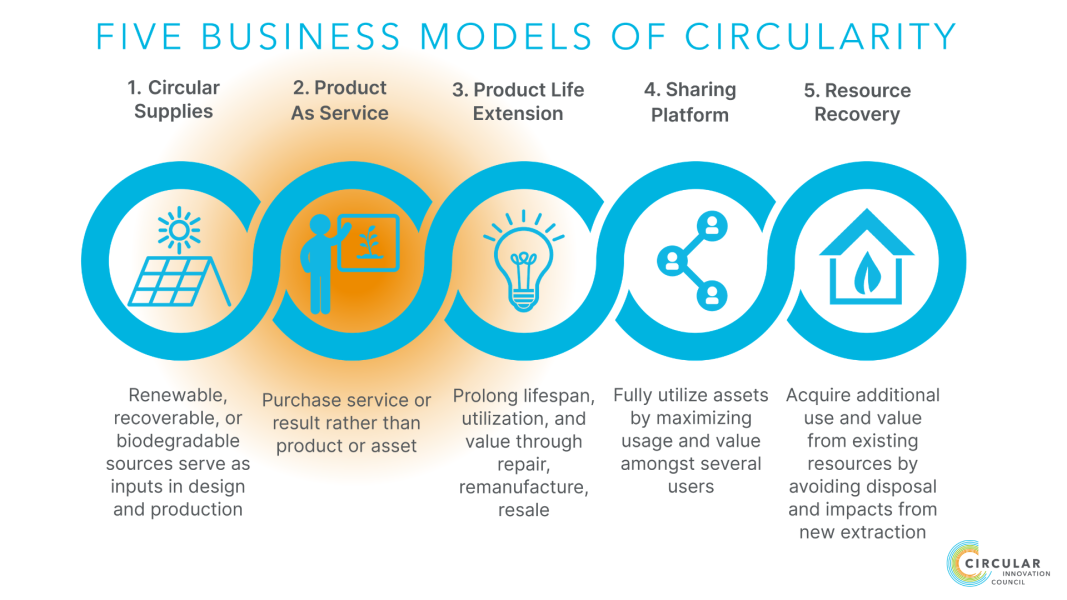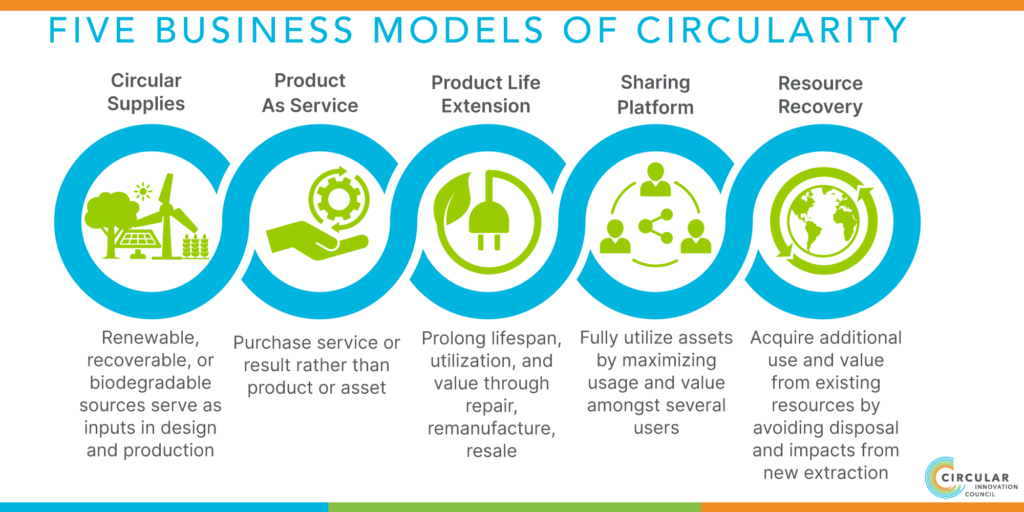
In the first installment of this series, we introduced the Five Business Models underpinning our transition to a circular economy. We describe how they relate to embodied or embedded carbon, the carbon contained in all materials that’s used during production. In this article, we delve deeper into the Circular Supplies business model, providing case studies and actionable steps we can all take.

Circular supplies in a circular economy means using materials and resources that are designed to be reused. This reduces waste and keeps their value high. Circular supplies function within closed-loop systems, where materials are continually recovered for reuse/refill, refurbishment and/or repair. This reduces the need for constant extraction of virgin resources.
A pivotal avenue for promoting material circularity centers on the principles of recovery for reuse and refilling. The momentum behind reuse models is on the rise, offering uncomplicated, ready-to-implement solutions suitable for businesses of all scales, aiming to curtail or eradicate single-use items. Embracing such initiatives extends benefits beyond environmental gains, encompassing an elevation of corporate responsibility and the cultivation of customer loyalty among adopting enterprises. Container reuse models exhibit their most effective performance by shifting the focal point of costs and value from initial production to subsequent refilling, returns, and reutilization.
Across Canada, a spectrum of reuse models has been set into motion. Some are currently undergoing testing via pilot programs, while others have evolved into enduring instances of operational reuse – such as The Beer Store in Ontario. These reuse models encompass:
The concept of container reuse within a shared pool paradigm presents a sustainable methodology for managing and transporting goods and products using durable, reusable containers across a collaborative network. In this framework, the emphasis shifts away from single-use packaging or containers. Instead, businesses and stakeholders partake in a communal reservoir of standardized, resilient containers that circular seamlessly through the supply chain. This model has gained popularity as part of a circular economy, aiming to minimize waste, reduce environmental impact, and optimize logistics efficiency.
LEAFF Circular Gifting, a CIC member, is rooted in a fundamental principle: creating an all-encompassing destination that caters to your needs for eco-friendly flowers, plants, gifts, gift boxes, and immersive virtual experiences. Their mission involves endorsing local enterprises such as farmers, artisans, indigenous communities, and others by incorporating them into their gift-centric platform situated in Ontario. Their array of offerings spans from repurposed and waste-free culinary products to plant-based plastic containers crafted through local 3D printing processes, all the way to flowers and plants cultivated on Ontario farms. This diverse range of products ensures the availability of exquisite sustainable gifts and gift boxes for any event or celebration. Augmented by their packaging approach that leaves zero trace in landfills, they have ingeniously formulated the ultimate holistic gifting initiative.
“LEAFF Circular Gifting is a local Toronto based company that offers sustainable gifts, gift boxes, virtual experience boxes, hotel room drops, event giveaways and recycled branded trade show bags across Canada. We work with our vetted local artisans, farmers, sanctuaries and Indigenous communities to bring the best of the best in curated gifts, 3D printed eco containers to low food mile and upcycled food products, keeping you on the cutting edge of all things local and sustainable.
Make every interaction with your clients and employees a sustainable one with our “soft education” on all our products and packaging. With our FSC friendly printed materials we showcase the sustainable specs of all of our gift items. All of our packaging is full circle and has QR codes to guide your recipients on how to return or reuse all the boxes, bags and void fill. Custom sustainable branding available on all bags and boxes.”
–Marla Brown, President, LEAFF Circular Gifting.
Please contact Marla Brown at marla@mbdesignsinc.com. In the tagline of your email, add “CIC” to book your free corporate gift consultation with Marla and access your CIC online promo code to receive 15% off all your gift and event experiences.
Concrete measures you can implement in your business to support the circular supplies business model include prioritizing the integration of post-consumer recycled content into your procurement process. Renewable, recoverable or biodegradable sources should serve as input in design and production. Additionally, establish mandates for the adoption of non-toxic chemicals or biodegradable materials. Integrate guidelines that cover recycling and final disposition protocols to guarantee effective end-of-life management and the recovery of materials or components. Consider arranging for products to be repurposed through designated organizations, thereby extending their usefulness. Lastly, ensure a documented chain of custody is in place to verify the conclusive fate of each product’s final disposition.
In our Circular Business Models series, we delve into the role of various business models in accelerating a circular economy.
Embodied Carbon: The New Frontier Accelerating the Circular Economy and Fighting Climate Change – Introduction article to the series discussing embodied carbon.
From Waste to Worth: The Role of Product Life Extension in Mitigating Embodied Emissions – For businesses and municipalities to understand the benefits and linkage of product life extension and circular procurement in minimizing embodied emissions.
Stay tuned for the upcoming articles through our website, social media (Facebook, LinkedIn, Instagram & Twitter), or email list!
We respectfully acknowledge that we live, work and play on the traditional territory of many Indigenous Nations and we humbly extend our respect to Indigenous individuals, communities and Elders, past and present, as the traditional custodians of this land.
Circular Innovation Council is a registered charity.
Charity Registration Number: 119112118 RR 0001